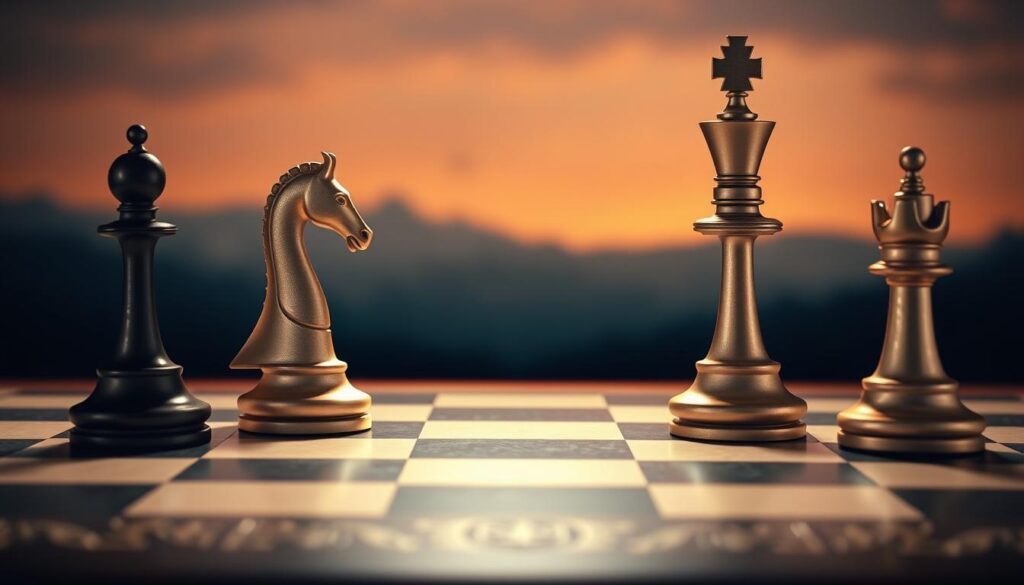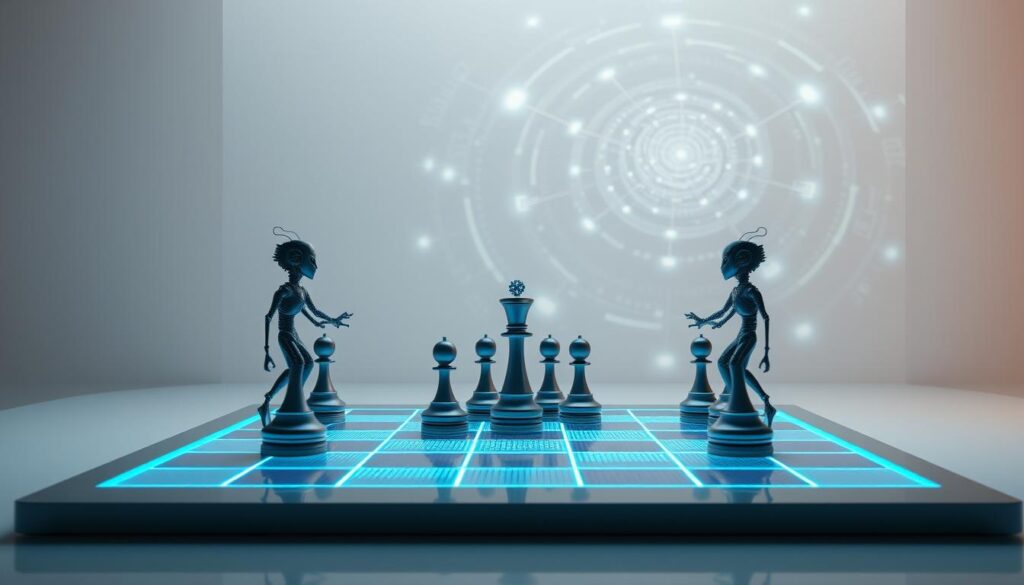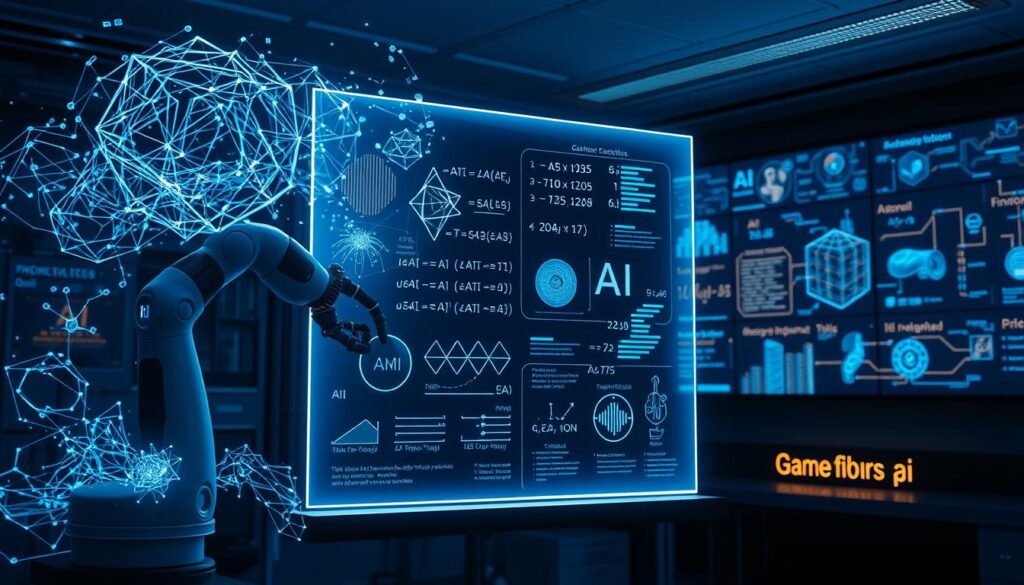Imagine being able to predict the actions of your competitors, or making informed decisions that give you a strategic edge in the market. Game theory offers a fascinating lens through which to analyze and understand the complex interactions between individuals and organizations.
Game theory is not just a theoretical framework; it has practical applications in economics and AI, helping to shape our understanding of competitive dynamics and strategic decision making.
By exploring the principles of game theory, we can gain insights into the strategic interactions that drive economic outcomes and AI development.
Key Takeaways
- Understanding game theory can improve strategic decision making.
- Game theory has significant applications in economics.
- AI development is influenced by game theory principles.
- Strategic interactions drive economic outcomes.
- Game theory offers a framework for analyzing competitive dynamics.
What Is Game Theory? Understanding the Basics
Essentially, game theory is the science of strategy, examining how people make decisions in competitive and cooperative environments. It provides a framework for analyzing situations where the outcome depends on the actions of multiple individuals or parties.
Defining Game Theory in Simple Terms
Game theory can be defined as the study of how people make decisions when the outcome is dependent on the actions of multiple individuals or parties. It’s not just about games; it’s about understanding strategic decision-making in various contexts.
The Elements of a “Game”: Players, Strategies, and Payoffs
In game theory, a “game” consists of several key elements: players, strategies, and payoffs. Players are the decision-makers, strategies are the actions they can take, and payoffs are the outcomes or rewards resulting from these actions. Understanding these elements is crucial for analyzing any situation through the lens of game theory.
Why Game Theory Matters in Our Everyday Decisions
Game theory matters because it helps us understand how to make better decisions in a wide range of situations, from business and economics to politics and social interactions. By applying game theory basics, we can anticipate the actions of others and make more informed choices, ultimately leading to more effective game theory applications in our daily lives.
The Fascinating History of Game Theory
From its humble beginnings in gambling to its current status as a cornerstone of modern economics, game theory’s history is both complex and captivating. The study of game theory has evolved significantly over the centuries, transforming into a sophisticated mathematical science that underpins many aspects of modern economics and beyond.
Early Beginnings: From Gambling to Mathematical Science
The roots of game theory can be traced back to the analysis of games of chance and skill. Early thinkers like James Waldegrave and Charles-Louis de Secondat, Baron de Montesquieu, contributed to the initial discussions around strategic decision-making. However, it wasn’t until the 20th century that game theory began to take shape as a distinct mathematical discipline.
Von Neumann, Morgenstern, and the Birth of Modern Game Theory
The publication of Theory of Games and Economic Behavior by John von Neumann and Oskar Morgenstern in 1944 marked a pivotal moment in the development of modern game theory. This seminal work laid the foundation for understanding strategic interactions among rational decision-makers.
John Nash and the Beautiful Mind Behind Equilibrium
John Nash‘s introduction of the concept of equilibrium, now known as the Nash Equilibrium, revolutionized game theory. His work, as beautifully portrayed in the film A Beautiful Mind, demonstrated how, in a non-cooperative game, players reach a stable state where no one can improve their payoff by unilaterally changing their strategy.

The contributions of these pioneers have made game theory an indispensable tool in economics, explaining phenomena from competitive markets to cooperative behavior. As we continue to explore the depths of strategic decision-making, the history of game theory serves as a reminder of the power of interdisciplinary research.
A Fun Introduction to Game Theory and Its Applications in Economics and AI
As we dive into the realm of game theory, we uncover a rich tapestry of mathematical, psychological, and strategic concepts that underpin some of the most critical decisions in economics and AI. Game theory is not just about winning or losing; it’s about understanding the intricate dance of decisions made by individuals or entities with different goals and preferences.
Why Game Theory Is Actually Exciting and Relevant
Game theory is exciting because it offers a unique framework for analyzing complex interactions. It’s used in various fields, from economics to political science, and even in biology to understand evolutionary dynamics. The relevance of game theory lies in its ability to predict and explain the outcomes of different scenarios, making it a powerful tool for decision-makers.
Some key areas where game theory is applied include:
- Understanding competitive markets and oligopolies
- Analyzing the strategic interactions between governments and firms
- Designing auctions and other economic mechanisms
The Delightful Intersection of Mathematics, Psychology, and Strategy
At the heart of game theory is the intersection of mathematics, psychology, and strategy. It involves using mathematical models to understand how psychological factors influence strategic decision-making. This intersection is what makes game theory so powerful and versatile, allowing it to be applied in a wide range of contexts, from AI game theory to behavioral economics.
Setting the Stage for Real-World Applications
The applications of game theory are vast and varied, ranging from game theory applications in economics to AI. In economics, game theory helps us understand phenomena such as oligopolistic competition and the behavior of firms in different market structures. In AI, game theory is used to develop algorithms that can make strategic decisions, often in complex and dynamic environments.
Examples of real-world applications include:
- OPEC’s oil price strategies, which involve complex game-theoretic interactions between member countries
- Spectrum auctions, where governments use game-theoretic principles to design auctions that maximize revenue
- The development of AI systems like AlphaGo, which used game theory to beat human champions in Go
Classic Games That Illustrate Key Concepts
Game theory comes alive through its classic games, which demonstrate key principles in action. These games not only provide insights into strategic decision-making but also reveal the complexities of human behavior.
The Prisoner’s Dilemma: Why Cooperation Is Tricky
The Prisoner’s Dilemma is one of the most famous games in game theory, illustrating why cooperation can be challenging. It involves two prisoners who must decide whether to confess or remain silent, with payoffs that depend on the combination of their choices.
The Battle of the Sexes: Finding Compromise
The Battle of the Sexes is another classic game that highlights the challenge of coordination. In this game, two players prefer different outcomes but both prefer to coordinate their actions rather than act alone.
The Ultimatum Game: When Fairness Trumps Rationality
The Ultimatum Game shows how fairness can influence decision-making. In this game, one player proposes a division of a resource, and the other player can either accept or reject the offer. If the offer is rejected, both players receive nothing.
Surprising Experimental Results
Experimental results from the Ultimatum Game have been surprising, as they often show that people reject unfair offers, even if it means they receive nothing. This challenges the assumption of pure rationality in game theory.
| Game | Description | Key Insight |
|---|---|---|
| Prisoner’s Dilemma | Two prisoners decide whether to confess or remain silent. | Difficulty of cooperation |
| Battle of the Sexes | Two players coordinate actions despite different preferences. | Challenge of coordination |
| Ultimatum Game | One player proposes a division; the other accepts or rejects. | Fairness over rationality |

Strategic Thinking: Nash Equilibrium and Beyond
Strategic thinking in game theory is exemplified by the Nash Equilibrium, a state where no player wishes to change their strategy. This concept, along with dominant strategies and best responses, forms the backbone of how players interact in various games. Understanding these elements is crucial for analyzing competitive and cooperative behaviors in economics.
Understanding Nash Equilibrium: When No One Wants to Change
The Nash Equilibrium occurs when no player can improve their payoff by unilaterally changing their strategy, assuming all other players keep their strategies unchanged. This concept is pivotal in predicting the outcome of games.
Dominant Strategies and Best Responses
A dominant strategy is one that is the best choice for a player regardless of what the other players choose. A best response is the strategy that is the most favorable given the actions of the other players. Understanding these concepts helps in analyzing how players make strategic decisions.
| Player | Strategy | Payoff |
|---|---|---|
| Player 1 | Cooperate | 3 |
| Player 1 | Defect | 5 |
| Player 2 | Cooperate | 3 |
| Player 2 | Defect | 5 |
When Equilibria Lead to Suboptimal Outcomes: The Tragedy of the Commons
Sometimes, the Nash Equilibrium leads to suboptimal outcomes for all players involved, a phenomenon illustrated by the Tragedy of the Commons. In this scenario, individual rationality leads to a collectively undesirable outcome.

Game Theory in Economics: Market Behavior and Competition
The application of game theory in economics provides valuable insights into market behavior and competition. By analyzing the strategic interactions between firms and consumers, economists can better understand the dynamics of various market structures.

Oligopoly and Strategic Pricing: The Cereal Aisle Battle
In an oligopoly, a small number of firms compete with each other, often leading to strategic pricing decisions. For instance, the breakfast cereal market is dominated by a few major players, who engage in a “cereal aisle battle” to capture market share. Game theory helps us understand how these firms interact and make pricing decisions that balance their desire for profit with the need to remain competitive.
Strategic pricing involves considering the potential responses of competitors to a price change. Firms may use price matching or penetration pricing to gain an advantage. By analyzing these strategies through the lens of game theory, businesses can make more informed decisions.
Auction Theory and Mechanism Design
Auction theory, a subset of game theory, examines how different auction formats affect bidding behavior and outcomes. Mechanism design, closely related to auction theory, involves creating rules and procedures to achieve desired outcomes in various economic contexts. Understanding these concepts is crucial for designing effective auctions and other market mechanisms.
- Auctions are used in a wide range of contexts, from art sales to government procurement.
- Different auction formats, such as English and sealed-bid auctions, can lead to different outcomes.
- Mechanism design helps in creating rules that promote truthful bidding and efficient allocation of resources.
Labor Markets and Bargaining Power
Game theory also sheds light on labor markets, particularly in the context of bargaining between employers and employees. The balance of bargaining power can significantly affect wages and working conditions.
Salary Negotiations as a Game
Salary negotiations can be viewed as a game where both parties have different strategies and payoffs. Understanding the principles of game theory can help individuals negotiate more effectively by considering the potential responses of the other party.
For example, an employer might use a “take-it-or-leave-it” offer, while an employee might counter with a request for additional benefits. By anticipating these moves, both parties can navigate the negotiation more successfully.
Real-World Economic Applications: Case Studies
Understanding game theory can provide insights into complex economic decisions made by nations and corporations. By examining real-world case studies, we can see how game theory is applied in various economic scenarios.
OPEC and Oil Price Strategies: A Global Game
The Organization of the Petroleum Exporting Countries (OPEC) is a prime example of game theory in action. OPEC member countries must decide whether to cooperate by limiting oil production to keep prices high or to cheat by producing more oil to gain a larger market share. This dynamic is a classic example of the prisoner’s dilemma, where individual self-interest can lead to a suboptimal outcome for all parties involved.
Spectrum Auctions and Billions in Government Revenue
Spectrum auctions, where governments auction off the rights to use specific bands of the electromagnetic spectrum, are another significant application of game theory. Companies bid for these rights, and the auction design can greatly affect the outcome. Game theory helps in designing these auctions to maximize government revenue while ensuring efficient allocation of spectrum.

Trade Wars and International Economics: The US-China Game
The trade wars between countries like the US and China demonstrate game theory in international economics. Tariffs imposed by one country can be seen as a move in a game, with the other country responding with its own tariffs. This tit-for-tat strategy can escalate into a trade war, affecting global markets and economies.
| Case Study | Game Theory Concept | Outcome |
|---|---|---|
| OPEC Oil Price Strategies | Prisoner’s Dilemma | Cooperation or Cheating |
| Spectrum Auctions | Auction Theory | Maximized Government Revenue |
| US-China Trade Wars | Tit-for-Tat Strategy | Escalation or Negotiation |
In conclusion, game theory provides valuable insights into various economic applications, from oil price strategies to trade wars. By understanding these concepts, we can better navigate the complexities of global economics and appreciate the strategic thinking involved in making significant economic decisions.
Game Theory in Artificial Intelligence: Teaching Machines to Think Strategically
Artificial intelligence is becoming increasingly sophisticated thanks to the application of game theory. By integrating game theoretical concepts, AI systems can make more informed, strategic decisions, enhancing their performance in complex environments.
Strategic Decision-Making
Game theory enables AI to analyze situations, predict outcomes, and choose the best course of action. This is particularly useful in competitive scenarios where AI must outmaneuver opponents or make optimal decisions under uncertainty.
Reinforcement Learning is a key area where game theory is applied. Through competitive play, AI agents learn to improve their strategies, adapting to new situations and opponents. This has led to significant advancements in AI capabilities, particularly in games like chess and Go.
Multi-Agent Systems
In multi-agent systems, multiple AI agents interact, often leading to emergent cooperative or competitive behaviors. Game theory helps in understanding and predicting these behaviors, enabling the design of more sophisticated AI systems.
Self-Driving Cars as Game Theory Actors
Self-driving cars can be seen as actors in a game theoretical framework, making strategic decisions to navigate through traffic safely. They must predict the actions of other drivers, pedestrians, and cyclists, and adjust their decisions accordingly.

| Application | Description | Benefit |
|---|---|---|
| Reinforcement Learning | AI learns through competitive play | Improved strategic decision-making |
| Multi-Agent Systems | Multiple AI agents interact | Emergent cooperative behaviors |
| Self-Driving Cars | Strategic navigation through traffic | Enhanced safety and efficiency |
By applying game theory, AI systems become more adept at handling complex, dynamic situations, paving the way for further innovations in the field.
AI Breakthroughs Powered by Game Theory
Recent advancements in AI can be attributed to the application of game theory principles. The strategic decision-making processes inherent in game theory have enabled AI systems to tackle complex problems in innovative ways.

DeepMind’s AlphaGo: Beating Human Champions with Game Theory
One notable example is DeepMind’s AlphaGo, which used game theory to defeat human world champions in Go. By analyzing vast numbers of game scenarios and employing strategic thinking, AlphaGo was able to outmaneuver its opponents. This achievement showcased the power of combining game theory with AI.
Poker-Playing AI: Mastering Bluffing and Incomplete Information
Another significant breakthrough is in poker-playing AI, where game theory has helped machines master bluffing and handle incomplete information. By developing strategies that account for the uncertainty of opponents’ hands, these AI systems have become formidable players.
Cooperative AI and the Future of Human-Machine Collaboration
The application of game theory in AI also extends to cooperative scenarios, where machines and humans work together. By understanding the strategic interactions between different agents, cooperative AI can facilitate more effective collaboration, leading to potential breakthroughs in various fields.
The integration of game theory into AI continues to drive innovation, enabling machines to make more strategic decisions and interact more effectively with humans and other machines.
Ethical Considerations and Limitations
While game theory provides valuable insights, its real-world applications are not without challenges. As we’ve explored the various applications of game theory in economics and AI, it’s essential to consider the ethical implications and limitations of this theoretical framework.
When Game Theory Models Break Down in the Real World
Game theory models often rely on simplifying assumptions that don’t hold in real-world scenarios. For instance, the assumption of perfect rationality can lead to inaccurate predictions when dealing with human decision-makers. Real-world complexities such as emotions, biases, and uncertainty can cause game theory models to break down.
The Flawed Assumption of Perfect Rationality
The assumption of perfect rationality is a fundamental limitation of game theory. In reality, humans often make irrational decisions, and this can lead to deviations from the predicted outcomes. As Herbert Simon once said, “Human beings are not capable of the kind of rationality that is assumed in game theory.”
“The capacity of the human mind for formulating and solving complex problems is very small compared with the size of the problems whose solution is required for objectively rational behavior.”
Balancing Competition and Cooperation in Society
Game theory highlights the tension between competition and cooperation in society. While competition can drive innovation, cooperation is essential for achieving social welfare. The key is to strike a balance between these two forces. The following table illustrates the trade-offs between competition and cooperation:
| Aspect | Competition | Cooperation |
|---|---|---|
| Innovation | Drives innovation through rivalry | Fosters collaborative innovation |
| Social Welfare | Can lead to inequality and social unrest | Promotes social cohesion and mutual benefit |
By understanding the limitations and ethical considerations of game theory, we can develop more nuanced and effective applications in economics and AI.
Conclusion: The Enduring Relevance of Game Theory
Game theory has proven to be a powerful tool in understanding strategic decision-making, with far-reaching implications in economics and AI. Through its application, we have gained insights into the complexities of human behavior and the intricacies of competitive and cooperative interactions.
As we’ve explored, game theory has been instrumental in shaping our understanding of market behavior, competition, and cooperation. From the prisoner’s dilemma to auction theory, its principles have been applied to real-world scenarios, informing policy and driving innovation.
The intersection of game theory and AI has led to significant breakthroughs, enabling machines to think strategically and make decisions in complex environments. As AI continues to evolve, game theory will remain a vital component in its development, driving advancements in areas like multi-agent systems and cooperative behavior.
In conclusion, a fun introduction to game theory and its applications in economics and AI reveals a rich and dynamic field that continues to shape our understanding of the world. As we move forward, the principles of game theory will remain essential in navigating the complexities of an increasingly interconnected world, providing an introduction to game theory that is both informative and thought-provoking.
